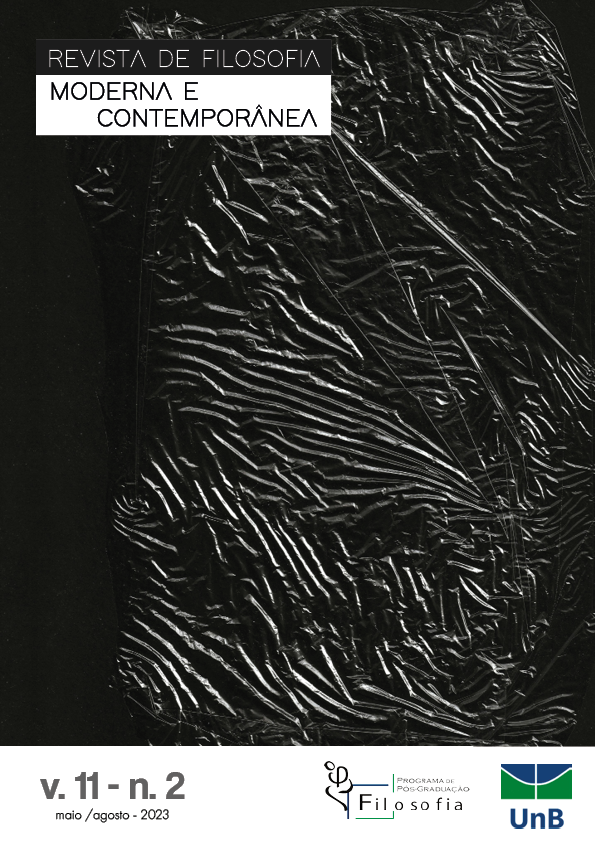On the Essence of the Human Being in Heidegger's Philosophy
DOI:
https://doi.org/10.26512/rfmc.v11i2.36761Keywords:
Being. Time. Language. Human being. Essence.Abstract
The intellectual trajectory of the philosopher Martin Heidegger is marked by devotion to the thought of the question of the meaning of being. The exact nature of the problem remains controversial. Heidegger himself intervened in the discussions in two ways. Refuting the reduction of the interpretation of his purpose to the meaning that founded the existentialist doctrine. And rejecting the understanding according to which he would have given up on his problem in Time and Being, written 35 years after it was announced in Being and Time. In this article, after contextualizing his work, we address Heidegger's main formulations on the question of the meaning of being: the relations of the being with time, with language and with man. Finally, we emphasize what we understand to constitute his central objective: to interpret the essence of the human being as destined to the understanding of the meaning of being in general. For Heidegger, prior to any form of manifestation of logical rationality, man is defined as the locus of irruption of the meaning of being.
References
HEIDEGGER, M. Meu Caminho para a Fenomenologia. In: HEIDEGGER, M. Conferências e escritos filosóficos. Tradução, introdução e notas de Ernildo Stein. São Paulo: Abril Cultural, 1973a, pp. 493-500. (Os Pensadores).
HEIDEGGER, M. Que é metafísica? In: HEIDEGGER, M. Conferências e escritos filosóficos. Tradução, introdução e notas de Ernildo Stein. São Paulo: Abril Cultural, 1973b, pp. 223-261. (Os Pensadores).
HEIDEGGER, M. Ser e Tempo. Tradução: Márcia de S. Cavalcanti. Petrópolis: Vozes, 1988.
HEIDEGGER, M. Sobre o Humanismo. In: HEIDEGGER, M. Conferências e escritos filosóficos. Tradução, introdução e notas de Ernildo Stein. São Paulo: Abril Cultural, 1973c, pp. 345-373. (Os Pensadores).
HEIDEGGER, M. Tempo e ser. In: HEIDEGGER, M. Conferências e escritos filosóficos. Tradução, introdução e notas de Ernildo Stein. São Paulo: Abril Cultural, 1973d, pp. 453-469. (Os Pensadores).
HEIDEGGER, M. Protocolo do Seminário sobre a Conferência “Tempo e Ser”. In: HEIDEGGER, M. Conferências e escritos filosóficos. Tradução, introdução e notas de Ernildo Stein. São Paulo: Abril Cultural, 1973e, pp. 471-491. (Os Pensadores).
HUHNE, L. O Ser e a Poesia segundo Heidegger. In: Revista Filosófica Brasileira. Rio de Janeiro: DEFI/URFJ, 1988, n. 01, pp. 99-103.
HUSSERL, E. Investigações lógicas: sexta investigação. Seleção e tradução: Zeljko Loparic e Andrea Maria A. de Campos. São Paulo: Nova Cultural, 1988. (Os Pensadores).
LYOTARD, Jean-François. A Fenomenologia. Tradução: Armindo Rodrigues. Lisboa: Edições 70, s/d.
PEGORARO, O. Imaginação e Tempo em Heidegger. Rio de Janeiro: Editora Uapê, 2006.
SARTRE, J. P. O existencialismo é um humanismo. In: SARTRE. Tradução e notas de Vergílio Ferreira. São Paulo: Abril Cultural, 1973, pp. 7-198. (Os Pensadores).
STEIN, E. Introdução ao pensamento de Martin Heidegger. Porto Alegre: EDIPUCRS, 2011.
STEIN, E. Seis estudos sobre “Ser e Tempo”. 5. ed. Petrópolis, RJ: Vozes, 2014.
STEINER, G. As idéias de Heidegger. Tradução: Álvaro Cabral. São Paulo: Cultrix, 1982.
Downloads
Published
Issue
Section
License
Copyright (c) 2023 Journal of Modern and Contemporary Philosophy

This work is licensed under a Creative Commons Attribution-NonCommercial-NoDerivatives 4.0 International License.
Copyright for articles published in this journal is retained by the authors, with first publication rights granted to the journal. By virtue of their appearance in this open access journal, articles are free to use, with proper attribution, in educational and other non-commercial settings.


